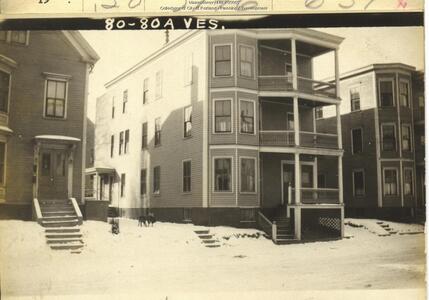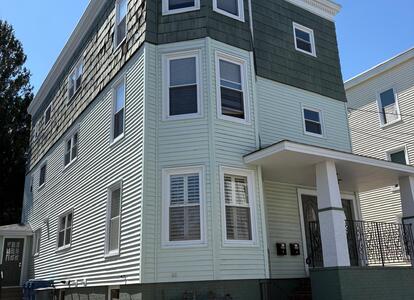80 Vesper Street - Shur Family Residence
Back80 Vesper Street - Shur Family Residence
80 Vesper Street
Tracking back to the Maine Jewish Museum, we travel 0.5 miles on Congress St. up Munjoy Hill. This is the area where Jewish immigrants moved when they left the East End. We take a right at Vesper Street and go to Number 80.
80 Vesper St. is a triple decker built in 1879. As you can see in the photos above, it looks today as it looked in 1924, except that the front decks on the second and third floors have been removed and the deck doors have been replaced with small windows. From about 1916 to 1930, when he finished law school, this was the home of Barnett “Barney” Shur (1905 - 1992).
Barney’s father, Joseph Shur, came to Portland from Lithuania in 1905. Joseph was supported by landsmen (a Yiddish word for fellow Jews who came from your home country/region) until he could make his own way. Joseph then brought over his wife and son, and later on, his brother Harry. Initially, the family rented an apartment on Chatham Street — the heart of the Portland “Jewish” district in the Middle, Hampshire, and Newbury Street area. Joseph purchased his first property, a residential triple decker, at 26 Federal Street. There, the Shurs occupied a two-bedroom apartment (Barney shared a room with his uncle), and rented out the others. When Barney was still in primary school, Joseph bought this property at 80 Vesper Street, making the Shur family part of the migration of Jews from the East End up Munjoy Hill.
The Shurs rented the first and third floor apartments at 80 Vesper to Mr. and Mrs. John Buckley and Mr. and Mrs. John Simonds, and the three families lived there for more than two decades, through times good and bad. Barney remembers that Mr. Simonds was ill for several years and in that time could not pay his rent: “At no time during his illness and nonpayment of rent was there any idea that Mr. Simonds would be evicted, and at the time of his death I know the Simonds family owed us several years rent which was never paid and which we never expected to be paid. While the word ‘ecumenism’ was not a widely used term at that time, nevertheless it existed at 80 Vesper Street and was proof that people of different faiths could live harmoniously with each other.”
The Buckleys lived in their apartment from the early 1920s until at least 1948, and reared two children there. John Buckley (1886-1945) worked at Nissen Bakery for 37 years. He and his wife were active in local amateur theater and singing and hosted several “Whist party” fundraisers at their home to benefit the Knights of Columbus, a Catholic social service initiative. Mrs. Buckley stayed at Vesper Street after John’s death. Her activities included being selected as an usher for the much-anticipated concert at the Portland City Hall in 1945 starring Paul Robeson, a renowned Black singer, movie actor, lawyer and activist.
For their part, the Shurs were very active in the Jewish community, so much so that in 1929, their friends organized an elaborate surprise 25th anniversary party at their home for more than 30 guests. Room decorations included blue and white streamers cascading to the table, concealing a gift of a silver cocktail set. In 1938, Barney got engaged, and his mother and sister hosted a tea at their home to honor his fiancée, Clarice Geller. Nearly 100 women guests from the Jewish community attended, as well as their longtime neighbor, Mrs. Buckley.
Ahead of all their social activity, the Shur family’s focus was on education, work and community. Barney initially attended the local North School (Stop E03), but after the move to Vesper Street, he transferred to the nearby Emerson School and then to Portland High School. Barney first went to the University of Maine, but transferred to Harvard College. He graduated from Harvard in 1922 and Boston University Law in 1930, right at the beginning of the Great Depression.
The Depression created enormous anxiety among families across the country. Very quickly, most of the banks in Portland and throughout the country closed. Some never reopened and depositors lost their money. There was no money to circulate, which meant a lot of people could not pay their rent or for groceries. Real estate values plummeted below the value of mortgages, and borrowers sought to renegotiate their loans with their banks. Barney, his father, and his uncle managed to renegotiate their mortgages with a reduced schedule of payments of interest and principal. But Joseph and Harry were getting older, and the bank needed security. So they required the newly-minted lawyer Barney, who at the time had personal savings of less than $1,000, to co-sign the new mortgage notes; after all, he was young, had no debt, and good prospects. With Barney’s signature, the banks felt a little more secure and the Shur family was able to retain their properties. Their confidence was well-placed: Barney went on to found Bernstein Shur, one of the most prestigious law firms in Maine.
Barney Shur was one of the Jewish Portlanders who was a leader in both the Jewish community and strengthening city government - and improving the relationship between them (see the Downtown Trail for more details). Shur played a major role in improving social access for Jews in Portland, particularly in confronting anti-Jewish discrimination at Portland clubs and resorts (see Stop D01). Professionally, he was Corporation Counsel for the City of Portland from 1946-1969, and is credited with inventing the practice of municipal law in the state of Maine. He also served as a board member and president of the Jewish Community Center (Stop D03), supported the Jewish Federation annual drive, and was a member of the national Jewish Welfare Board. Beyond the Jewish community, he sat on the boards of many civic organizations, including the Boys Club of Greater Portland (as it was then known), the United Fund Campaign, the Community Chest (now United Way), and the Maine Savings Bank.

